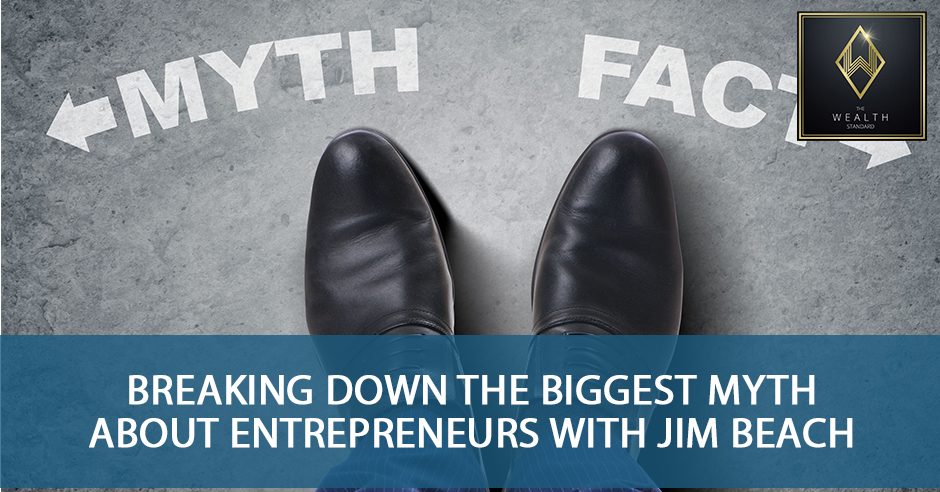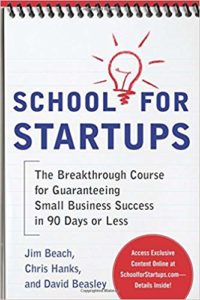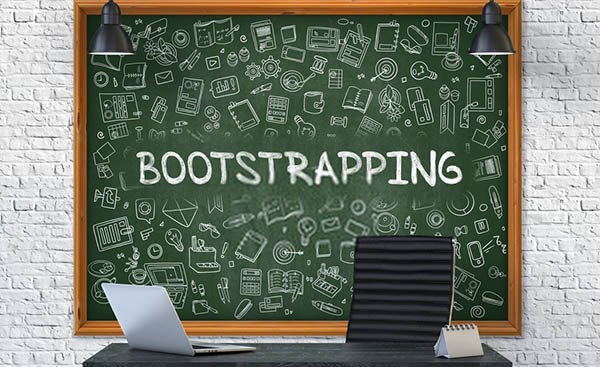Podcast: Play in new window | Download

There are a lot of misconceptions about being an entrepreneur. Most of the time, we tend to think that to succeed in it, one has to have that passion from which they turn into a career. Speaker and entrepreneur Jim Beach gives some practical advice and counters the biggest myth about entrepreneurs. He talks about the myth of being a risk-taker to that of the many stereotypical entrepreneur archetypes. Sharing how one can still become an entrepreneur even if the passion is still not there, he shows some unconventional ways that will even comfort us in our own journeys. Jim is a sought-after speaker on business, low-risk entrepreneurship, and personal development. He takes us to the story of how he redefines or refocuses passion, asking each one of us to just get off the sofa and start moving.
—
Listen to the podcast here:
Breaking Down The Biggest Myth About Entrepreneurs with Jim Beach
Jim, it’s awesome to have you on. Thanks for spending some time with me.
Thank you very much for having me. It’s my honor.
Jim, why don’t you give the audience a brief background in your career in the entrepreneur space?

School for Startups: The Breakthrough Course for Guaranteeing Small Business Success in 90 Days or Less
I was summarily dismissed from Coca-Cola at the age of 24. I thought I was going to be there forever and they decided otherwise. I was completely devastated. I was as corporate a man as you could be at that young age. I wanted a corporate career. One of the last things they told me at Coca-Cola was that I would be a great entrepreneur. I’d never heard the word and didn’t know what it was. I did that. I went out and started my first business when I was 25. I grew it to 700 employees. It was in the children’s education space. At 31, I started teaching at a university. I was a university professor with a small P, not a PhD guy, but the one who taught all the classes for ten years. During that time, I came up with some interesting philosophies on entrepreneurship that I hope we can talk about. I wrote a book about that called School for Startups, which was published by McGraw-Hill. It sold well. That turned into a radio show and here we are.
You’ve done it all sounds like. Are ready to hang up the boots? Call it a career?
I’m one of the people that would get bored in ten seconds. I don’t like golf.
That’s part of my argument is even if you do like golf, humanity, especially a human being, especially one that is experienced entrepreneurship and creation, your space understands that life doesn’t end at 60, 70, 80 or 90. It ends when it ends. Production, whether it’s business or mentorship or consulting creates that livelihood in people. Let’s get into some of the nature of your books and the business that you’re a part of. What you’ve experienced over the years in regards to what is the times of Coca-Cola until now. Everybody knows what the word entrepreneur is. Maybe from that and then until now what your experience has been seeing what is possible for those that have an entrepreneurial vision?
The thing I would like to focus in on are some of the myths that I have seen and the perception of some of those. The biggest myth about entrepreneurs is that they are risk-takers. You have to be this risky guy or maybe there are three things to entrepreneurship. You are creative somehow, you are somehow risk excited and you’re going to do something risky. Number three is that you have a passion for what you do. That’s become the definition of the entrepreneur. I’m a risk-taker who found a creative idea to start a new business that I’m passionate about. I believe I can make a lot of money with that business or something silly like that. I find that because of that we have lots of people sitting on the sofa who are not trying entrepreneurship because they’re afraid of one of those three things.
One of those three things is preventing them from becoming an entrepreneur. I find that all three of them are completely false. That entrepreneurs are not risk-taking people. As a matter of fact, I do every single thing I can think of to reduce risk before I start a business. If there is a risk, I don’t start the business. I start the less risky ones. The more entrepreneurs that I meet, the more people I interviewed, it’s the same with them. Risk is a bad thing. We’re not creative. 93% of new businesses are copies of existing businesses. That data comes from the London School of Economics. There are not that many new ideas. If you want to be an entrepreneur, you find what someone’s doing in Salt Lake City and copy and do it in Atlanta. There’s nothing wrong with that. Pepsi, Coca-Cola, Mountain Dew, Hilton, Hyatt, Marriott, Mercedes, Honda and Toyota. There are lots of me-too companies. You don’t have to be original to go be an entrepreneur. Just find an idea and execute the daylights out of it.
Life doesn't end at 60, 70, 80, or 90. It ends when it ends. Share on XBefore we get to the third point, maybe in your mind, define what an entrepreneur is. At the fundamental level, I have a four-year-old. If you were talking to my four-year-old and explaining what an entrepreneur is, how would you describe it?
Someone who goes out and sells things to people. A four-year-old would understand that. I have stuff that people want to buy. That could be different stuff.
It comes down to how do you define selling? Selling is the exchange of money for something that’s more valuable than money. In the context of your other businesses, it’s improving. It’s creating more value than was currently there. If you seek ways to do that, that is the beginnings of that entrepreneurial ideas to improve whatever exists or to create something that doesn’t exist.
I don’t want you to wait for something that doesn’t exist because that creativity lightning bolt may wait until you’re 90 or maybe never come. Go start something now. There’s this idea of the Corridor Principle. As you go down the path of entrepreneurship, the life of entrepreneurship, there are doors along the hallway, this path that you’re on. You could never see into those doorways until you had gone down the path a little bit. Because of where you are, you don’t have a view that allows you to see the opportunities in those rooms. By becoming an entrepreneur now, doing something very me-too, not creative but running a good business will then give you the opportunity. It’s a beautiful analogy. What it says is that we should get off the sofa and start something now no matter what it is.
There are opportunities all around to be an entrepreneur in that definition. You’re right. There are some fundamental things that scare people about being an entrepreneur or it separates that persona from who a normal person is. If you define it in the context of whatever environment that you’re in, figuring out a way to be valuable to somebody else. Once you have that mindset, the opportunities are infinite.
I say that with my coaching and what I’m working on. I’m not trying to create 100 millionaires. I’m trying to create someone worth $3 million or someone who makes $300,000 a year. That’s my goal and that’s my definition of success. You don’t have to be lifestyles of the rich and famous, yachting, private jetting to be very successful and have enough for you and your family to survive on. That’s very realistic for everybody.
Let’s go through that. First thing is you dispel the idea that being an entrepreneur is risky. Then you got into this instead of doing the whole Peter Thiel, Zero to One, creating something out of nothing. An entrepreneur can be somebody that improves an existing business or an existing process in a role that they have. I know you were going to get into a third point or subsequent points. Would you mind picking up where you left off?
That would be passion. There’s this overwhelming belief that you have to be passionate about what you sell. I would counter that. I’ve sold purses. I’ve sold leather jackets. I’ve sold a lot of stuff that I don’t buy, that I would never buy. I must tell you, that doesn’t bother me at all. I would like to redefine or refocus passion. That passion for a product is called materialism. I am passionate about the lifestyle that I lead. I am passionate for the fact that I drove four carpools. I had zero commutes. I wore what I wanted to. I wasn’t responsible to anyone. I made as much money as I was willing to work to do to get that money. I am passionate about the entrepreneurship itself. That can be enough for a lot of people. The joy of having an Amazon re-seller business that you buy stuff in bulk and sell it on Amazon. I’ve seen how that simple, non-creative, non-risky business that no one should be passionate about can change people’s lives and change their perception of themselves.
I’m passionate about the opportunity that it presents. I believe God gave us a certain basket of skills when we were born, when our DNA was created. We’re good at this and not good at some other things and I’ll never be able to throw a baseball. Entrepreneurship uses those skills better than anything else could. I could still work as CEO and my creativity would not be utilized. I could still work at Coca-Cola and not use the skills necessary that are used by my entrepreneurship. That’s exciting to me. Overall, just being an entrepreneur is cool enough that I don’t have to love what I’m doing. I have enough fun selling purses that I’m willing to sell purses if I could make some money doing it.
We should get off the sofa and start something now no matter what it is. Share on XLet’s breakdown then the stereotypical entrepreneur archetype. The entrepreneurial archetype is that person is beaming what you’re quoting as passion. Can you break down that one more time and talk about who would you consider an example of that passionate person and stereotypical definition? From what you’ve seen, a person does not necessarily have to be this overly A-type of personality to go out and find something that they’re either gifted at or interested in to pursue.
There are several different people that jump to mind. I would think of an entrepreneur who is obsessively passionate as someone like Bill Gates. Not necessarily in his first generation, but in his second generation as a philanthropist. He is obsessive with that. He’s following his passion there. His desire to solve malaria in Africa, he’s going about it at 100% wrong, but he has a tremendous passion for it. He’s also very interested in helping education. As a former professor, I’m not sure that he’s doing the right things there either. Nevertheless, his passion there is laser-focused. On the other hand, we have someone like Richard Branson who I think that of the 700 businesses that he owns, he’s probably passionate for three or four of them. The Virgin Galactic Airline, the outer space vehicle. Maybe still the airline, but I bet he’s pretty tired of the airline that hasn’t done any work there in ten years. He’s not interested in the thing that got them started the stores anymore. His passion is the love of the game. He’s enjoying the game. Whatever the business is, he’s going to have fun doing it and give it an interesting, sexy, unique twist. I don’t think he loves all of those businesses that he runs. He enjoys the, “Let’s come up with a new brand that exudes confidence. That’s cool and sexual. I get to jump out of a parachute or a hot air balloon wearing a parachute to promote it.” He’s enjoying promoting it more than me as the brand. He never goes back to those businesses on day three. He’s not there on day three.
He gets it all up and running and passes the baton.
Those are two very different views of entrepreneurial passion. All I’m suggesting is that if you wait to do what you’re passionate about, it may skip you altogether and you may lose the opportunity to go off and start a great consulting practice very similar to your last job. There’s nothing creative. They’re very similar to your last job. You steal some of the clients and you do the same work very well. That may not be your passion, but that may allow for you to do your passion in three or four years from now. What I’m passionate about is woodworking, but I suck at it. I’m bad at it. What I’ve learned is that I can enjoy my passion for what’s called the weekend and make more money so that I can go to a woodworking school more often.
You talked about natural gifts and natural abilities, that we’re all different. We all have different personalities, different strengths and different tendencies. From what you do as a consultant or a coach, is there a method to discover some of those interests? Maybe not passions but interest and figuring out a way to monetize that through business? Is that where you were saying with that comment?
I don’t think so. I have a hard time understanding those people; the people who at the age of 30 don’t know what they’re interested in or what they’re good at. That makes me wonder what is going on there. If an eight-year-old doesn’t know that, I understand. By the age of 30 or 40 or whatever you enter into the world of entrepreneurship, you should know, “I need a business partner, I need a cofounder because I’m not very good at speaking in front of people. This business is going to require a lot of speaking in front of people and so I should go get a cofounder.” I did that personally in my first business. I had a cofounder, Doug, whose sole responsibility was to talk and he was amazing at it.

Myth About Entrepreneurs: If you wait to do what you’re passionate about, it may skip you altogether and you may lose the opportunity.
He’s amazing at it and he probably liked it to an extent, you didn’t like it even though you may have been amazing at it. Isn’t that a feeling or a flag or a hint of what you should and shouldn’t do? I know you love working and there’s obviously hobbies that are out there but have you in your entrepreneurial experience seeing tons of businesses speaking, talking to a lot of people, is there a common connection fundamentally between what a person does as an entrepreneur and their level of interest?
Their level of interest in what?
Whatever they’re doing.
I don’t think so. I am working so that I can go to Disneyworld, so that I can take my family on nice vacations, so that I can go to woodworking school, so that we can live the standard that we all want to live. To me, that is the ultimate goal and I’m willing to focus in on that and say, “I’m willing to sell purses if I can get toward that ultimate goal.” For me, the passion is almost irrelevant. I am passionate about the lifestyle. My friends go to work, they commute and they get told what to do. Their destiny is in someone else’s hands. None of that is true for me and that’s what I’m passionate about.
I’m having a hard time distinguishing because I agree with you in that respect. For me, it’s one of those things where if you sell purses to be able to go to Disneyland, is something that will get you what you want? Long-term if you’re selling purses your entire life, is it possible to have a level of fulfillment that some entrepreneurs get? That’s where you go back to Richard Branson. He was probably passionate at one point in his life about his Virgin Records and the airline and the passion’s changed. As far as the future vision, I look at those that get on a highway and commute every morning and hate what they do. Then go home and try to disregard all that crap and be a good parent and a good husband or wife. I look at where we’re at as a society and because of how much commerce is going on in opportunities that exist, is it possible to find something that you like doing that you make money at? You were also able to provide some fulfilling lifestyle for your family? That’s where I’m disconnected.
That’s largely where the corridor principle comes in. There’s an important thing here. One idea that we haven’t talked about yet is that entrepreneurial things are created to be sold. Businesses are created to be sold. The first business that I was involved in childhood education was an amazing business, but we had thousands of kids every day that we were taking care of. The stress level was not enjoyable. I like my kids but that’s it. That’s where I draw the line. I got out of that business as quickly as within seven years, pretty much as quickly as I could when I was 32 years old, which allowed me to go off and do something that maybe I did enjoy more.
Open your mind to the opportunities that are all around you and figure out ways to create more value for people. Share on XThe experience gives me the credibility, the opportunity, the fundraising skills, hopefully, some cash in pocket to go off and say, “I had your business with 700 employees. I want to be a college professor and I can go do that because I have the credibility of having a 700-person business.” That allows me to do what I am passionate about, which is teaching and sharing and helping other people down the path. I’m willing to do to get off the sofa because that long-term will lead to my goal of eventually running a business that I love obsessively and fulfills my creativity and my risk and all of that. I want people to get off the sofa and say, “I’m going to go start something that I can put up with.” God knows where that’s going to lead.
That helps me a ton. I would add to that the getting off the sofa idea, some people were naturally lackadaisical, but we’re also naturally-driven. It’s an interesting dichotomy there. If you look at the discovery process, isn’t there normally some level of anxiety or friction or stress that tells us whether we’re doing something we want to do or not that eventually leads us to what you explained? Isn’t pain, friction and anxiety an environment part of the process?
You mean the pain and the anxiety of the horrible job that I had beforehand? The horrible life beforehand? I hope that motivates you to get off the sofa and start doing the research. One of my favorite stories is about my step-brother-in-law. His name is Joey and he had a job working on a shrimping boat, peeling shrimp, taking care of freshly caught shrimp. I can’t imagine anything worse. His goal was to have a restaurant bar of his own. Eventually, he was able to say to save $5,000. 99% of our risk universe would say you cannot open a bar or restaurant for $5,000. He did it. He didn’t even have enough money for kegs. He bought cases the first weekend. He sold those cases and made what’s called a profit. Eventually was able to buy half of Athens, Georgia, which is where the University of Georgia is. He owns half of the town and something 20 or 30 different bars and restaurants off of a $5,000 investment to get started.
Off of working on a shrimp boat doing something he didn’t like to do?
For him, the interest is he was willing to say, “My dream is to have a restaurant bar with all the brewing equipment and all of the brass and the beautiful fixtures. It’s going to have dark mahogany and the walls are going to have leather embed in them and stuff.” That’s his dream. What he ended up opening was in an abandoned barbershop. It still had the linoleum floor. It had the big rings on the floor where the chairs used to be, cinder block walls, exposed metal rafters and a bathroom that didn’t pass code. He spent $4,000 of the $5,000 getting the bathroom up to code. He then went to a flea market and got $200 worth of abandoned chairs that we would throw away on the side of the road and opened a bar. His standards were so low because the alternative of working on the shrimp boat was so bad that he said, “I’m willing to take the long view on this. To put my dream aside and to start something that’s feasible now.”
You can argue that it’s right on the side. It’s in the future and the path to get there requires that you have to put a lot of money in the bathroom before you get to the Mahogany and the brass and what his future vision was.

Myth About Entrepreneurs: Sometimes, bootstrapping is healthy – taking on a big responsibility and try to circumvent steps along the way.
Eventually, someone bought the piece of property across the street, put in $3 million into a restaurant. It failed. The lesson is, how many beers do you have to sell to repay a $5,000 investment? How many beers do you have to sell it to repay a $3 million investment? It’s a good lesson.
Sometimes bootstrapping is healthy and taking on a big responsibility and try to circumvent steps along the way, which that restaurant across the street did. That’s how you learn those painful lessons. They probably had to go backward and then learn the lessons that Joey was learning.
Joey also did something smart. He reduced the risk. His risk was $5,000. If he lost, he’d have to go back to the shrimp boat.
Being able to rebound from that versus bankruptcy on $3 million. That’s a longer lesson to learn than having to go back on the shrimp boat and get another $5,000 and invest it wisely the next time.
Joey got off the sofa.
When you’re in your book, School for Startups, is it targeted to the normal individual or who’s that person you are writing to when you wrote that book?
Life, in general, is never this calculated path where if you do X, Y and Z, you're going to get A. Share on XThe guy sitting on the sofa who is trying to say it can be done. There are some stories in the book of some businesses that I started when I was teaching at the university. I bet my students on a semester by semester basis that I could start a business that semester, get a cashflow positive that semester, repay the startup capital that semester. They got to choose the country and the industry that I would start the business in. The first one was Pakistan and furniture. I had to start a Pakistani furniture company. After that, it was a Brazilian leather purse company. The year after that it was Argentinian painted leather for leather jackets. The book talks about some of those stories and talks about the rules that came out of those experiences. The major primary rule is don’t spend any money, bootstrap. I can go back and show you how all of the ideas that I had were not creative. The Pakistani chair idea, the furniture company, most people look at and go, that’s a very creative idea. I go, “I can tell you the flea market that I saw the idea that I copied from.” I saw the idea in Santa Barbara ten years before I started the business. When I had to start a Pakistani furniture company, I was like, “Santa Barbara ten years ago, I’m going to copy that idea. I’m going to do it for under $5,000.” Very little risk, zero creativity. I was not passionate about it, but it was a homerun success.
In the book, you addressed that principle of getting off the couch obviously, but also how individuals could be more entrepreneurial in their current environment whether it’s a full-time job or in school. Do you give direction there?
There are some examples. There a lot of characters in the book, real-life stories. One of my students, he was a junior and a senior who was making $100,000 a year on Best Buy arbitrage, going to Best Buy as they liquidated stuff. Buying $10,000 of stuff that Best Buy considered at the bottom of its life cycle. He would then sell on eBay and Amazon make $100,000 a year doing that. Those things are in there. The book is designed to be very motivational and say, “If this twenty-year-old can make $100,000, what’s your excuse?”
Have you seen it in maybe other circumstances where you have companies that motivate or incentivize for that entrepreneurial mindset? I know some tech or manufacturing where if you come up with some improvement to the intellectual property they already have, that you’ll be able to profit share off of that. Have you come across a lot of companies that have maybe not to that extent, but similar incentives to be able to provide improvements to efficiency or of that nature?
I don’t think you’re going to like my answer on this. The honest answer is I see that with every company until they have 50 employees. Then eventually that becomes something that’s written in the handbook that no one ever looks at. Back on my own business, when I was running a business and we were doing $12 million, $15 million a year in revenue and I hired my brother right out of MBA school. He came in and he was like, “You should try this. You should try this. You should do this.” I was like, “I had done it. I had seen it. The competitor did it. I don’t want to try it. I don’t like that.” I had an off the cuff response for every one of his bright ideas. Some of them we ended up trying, but a lot of them didn’t work. That part of the entrepreneurial story is getting comfortable with what you do and then not wanting to mess with it. That happens somewhere after $25 million in revenue or something like that. That eventually these incredibly creative entrepreneurial places that are designed with their baked DNA and we’re going to have a Friday creativity meeting every Friday with pizza and foosball. Eventually, that gets shut down by the venture capitalist. I don’t see it in the ten-year-old companies. I see companies that claim that they’re still doing it. When you dive deep, you very rarely see that. Maybe I’m a young curmudgeon.
Failure is vital in the process because it's part of the learning process. Share on XI would say life, in general, is never this calculated path where if you do X, Y and Z, you’re going to get A. It’s one of those things where sometimes there are great ideas, sometimes there are crappy ideas. I was curious because I’ve seen at a smaller level as you were explaining I’ve also seen it at a very high level at Honeywell in particular. They have a program and it’s all calculated into the engineers. The guy that I was talking with was a graduate of MIT. He made $500,000 a year, three times what his salary was because of the processes that he created that allowed Honeywell to save a bunch of money. He did some level of profit sharing with them and had ownership in the IP. It’s the environment and it’s the principle. Even though that doesn’t exist, I still think there are opportunities for anyone to figure out ways in which they can improve, whether it’s a process, whether it’s a product, whether inside the company, outside the company. Your point is to open your mind to those opportunities that are all around you and figure out ways to create more value for people so that you’ll have more money.
It will be interesting to see where Honeywell is ten or fifteen years from now because in essence, Honeywell is a startup. They were a huge high flyer of the ’70s and ’80s and so many other companies that crashed and burned. They are now finding a new niche for themselves like Xerox. There’s no comparison between the business that Honeywell does today and what they did in the ’80s or the ’90s. It will be interesting to see if Honeywell still got those creativity DNA packets ten, fifteen years from now.
It’s hard enough at a high level when you have hundreds of employees, probably thousands of employees to orchestrate something like that is definitely difficult. I would assume that something good has come from those programs. You also have brothers-in-law that have sophisticated degrees that tell you, “You should do this with your toilet paper. Have recycled toilet paper instead of the thick stuff to save some money.” My point is I’m totally in-sync with you in regard to getting off the couch and doing something that provides a level of fulfillment and I would say failure sometimes and taking risk. People don’t like that because they have a probability of failing. If you think about it, re-contextualizing failure, it’s vital in the process because it’s part of the learning process. It’s part of growing. You don’t know something and suddenly accelerate your path to perfection. There are these friction points, these failures and these dips along the way. That’s a good thing because the more of those you have and the more resilient you are, the more you’re going to be able to create it. The more money that is going to have and so goes the process.
Somehow, I always forget to leave off my resume that during that time I had 700 employees, I also got $10 million in personal debt. The bank called and said, “We’re seizing all of your assets and you have 30 days to repay everything.” I forgot to tell that part of the story for some reason.
That probably didn’t keep you up at night at all. That’s the thing. If you have a freaking $10 million mistake, talk about the lessons that you learned along the way. In the moment you’re like, “Get me out of this.” In hindsight, I’m assuming that that was one of your most valuable times.
I learned a lot.
This has been an awesome conversation and you’ve been around the block a number of times you speak. Do you do personal consulting and coaching as well?
Of course.
The book, which is the School for Startups: The Breakthrough Course for Guaranteeing Small Business Success in 90 Days or Less, that’s your only book at this point, correct?

Free Radio & Podcast Marketing In 30 Minutes: Fire your publicist and leverage free radio and podcasting to market your business, brand, or idea
No, I have another book that came out. It’s called Free Radio & Podcast Marketing In 30 Minutes. This is a series called in 30 minutes. It’s a series for people that the dummies books are too complicated. In 30 minutes, I teach you what you need to do to get on hundreds of radio and podcast interviews to sell hundreds of thousands of dollars of your product for free. I have that book out as well. You can read it on one airplane flight.
I would argue that that’s not below the level of a dummy. All the complicated stuff is at the level below the dummy because it takes a genius to take a lot of sophisticated information and simplify it so the average person can understand it and use it. Talk to us briefly about your role as the Executive Director of the International Entrepreneurship. What’s that role? What’s the purpose of that organization?
I’ll let you in on one of my little secrets here. That’s a great a loss leader as Walmart would say. That is a thing that I do from time to time. Sometimes it’s newsletter format, sometimes it’s videos where specific people get information about levels of entrepreneurship around the world. What countries are growing? What countries are retracting entrepreneurship? The main reason I do it is as a marketing tool for my speaking. In the last few years, I’ve done India probably ten times in Egypt, Dubai, Korea, Japan, Brazil, Argentina and Chile. I’m sure I’m leaving out some places. All of that happens because of the Business International Entrepreneurship, which is a marketing vessel for me. It’s a faux business designed to get me business in other areas.
That’s not a bad thing. The principles of entrepreneurship don’t have country boundaries.
They don’t so the rules apply. I’ve made a lot of money off of that though.
Awesome to have you on.
Thank you so much. It’s been fun.
It was great to meet you. Thanks again for the information.
Important Links:
- http://www.JimBeach.com/
- https://www.Amazon.com/School-Startups-Breakthrough-Guaranteeing-Business/dp/0071753931
- http://SchoolForStartupsRadio.com/
- https://Twitter.com/entrepreneurjim
- https://www.Facebook.com/james.a.beach
- https://www.LinkedIn.com/in/jamesabeach/
- School for Startups: The Breakthrough Course for Guaranteeing Small Business Success in 90 Days or Less
- School for Startups radio show
- Zero to One
- Honeywell
- Free Radio & Podcast Marketing In 30 Minutes
About Jim Beach
 Jim Beach’s against-the-grain approach to entrepreneurship is not your typical business advice. He argues that entrepreneurship isn’t about creativity, risk, and passion, and that any individual can become a successful business owner without any of those traits.
Jim Beach’s against-the-grain approach to entrepreneurship is not your typical business advice. He argues that entrepreneurship isn’t about creativity, risk, and passion, and that any individual can become a successful business owner without any of those traits.
At the age of 25, Jim started the American Computer Experience and grew the company with no capital infusion to $12 million in annual revenue with over 700 employees. The company was the world’s largest technology training company for children, and enjoyed tie-ins with Microsoft, Intel, Lego, NASA, and many others.
After this business was sold, Jim taught at Georgia State University and was the top-ranked Business School professor 12 semesters in a row. His book, School for Startups: The Breakthrough Course for Guaranteeing Small Business Success in 90 Days or Less, is frequently atop Amazon’s best sellers lists, and is the basis for his radio show, School for Startups Radio.
Jim has become a sought-after speaker on business, low-risk entrepreneurship, and personal development.
















